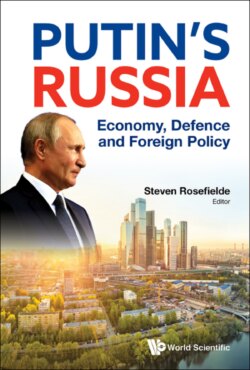Читать книгу Putin's Russia - Группа авторов - Страница 15
На сайте Литреса книга снята с продажи.
Performance, Potential and Prospects
ОглавлениеRussia’s economic future viewed through the prism of World Bank global statistics is satisfactory in the short term, better during the remainder of Putin’s presidential tenure and superior for decades thereafter under a more liberal regime. Its data show that Russia’s economic performance in the recent years has lagged that of the EMDEs (Emerging Markets and Developing Economies; that is, low-tiered advanced nations including Brazil, India, China and South Africa) but paced the West despite a severe petroleum price shock and strong economic sanctions imposed by America and the European Union, behaviour that accords with the World Bank’s priors. Russia as a low-tier advanced nation (not an EMDE as the BRICS classification suggests) should have grown less rapidly than emerging nations and should only have slightly outperformed higher tier advanced nations due to the “catch up” effect. Figure 1 confirms that this more or less is how Russia’s economy behaved.
The World Bank moreover expects better results in the years immediately ahead because of improving trends in Russia’s competitiveness (especially with respect to small and medium-sized enterprises),10 government administrative efficiency,11 education12 and social welfare. Tomorrow, it predicts, should be better than today, and in the fullness of time, the World Bank expects Russia to converge to the global high-economic performance frontier as the Kremlin transitions to democratic free enterprise, contemporary animosities between Washington and Moscow notwithstanding.
Figure 1:Global growth is broadly stable (in %).
Source: World Bank.
